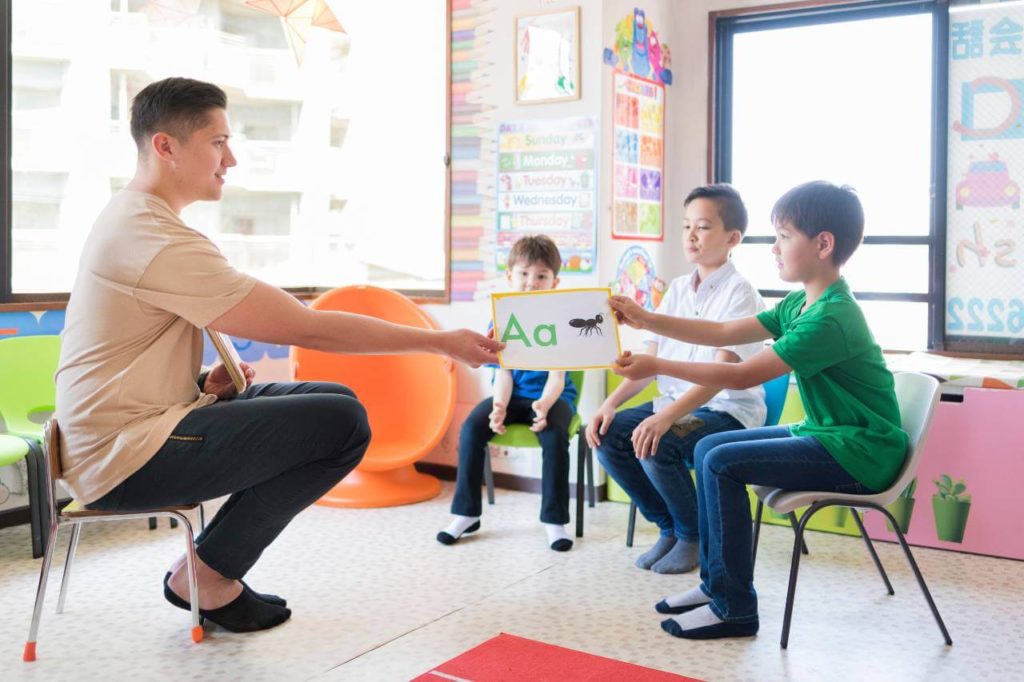Teaching English as a Foreign Language can be done in kindergartens and universities, primary schools and high schools, on summer camps and in-company. As a TEFL teacher you might teach second language learners of all ages.
On the surface it’s obvious there are differences between a child and an adult. Temper tantrums, potty training, smoke breaks and coffee addictions spring to mind! But how does that translate to learning and, in particular, learning a second or a foreign language?
Read more: Is It Easy To Find A TEFL Job?
What is the difference between child and adult learning?
Let’s look at a few considerations.
When it comes to adult learners and Young Learners, we can find differences in:
- classroom situations,
- behaviour,
- personality, and
- intellect.
We can see the sum effect of these differences in the differences between adults and children in learning a second (or foreign) language.
What are the major differences between adults and children and learning a second language?
Behaviour
Children are high energy. Of course, many adults are high energy too but children are next level – just ask any kindergarten teacher!
Children cannot sit still for long periods of time, while adults can. Children cannot focus for extended times either.
Adults have more self-control than children. They can be trusted to work independently and focus on a single activity until it is complete.
Classroom management
These behavioural differences lead to differences in classroom management.
Young Learners are children, so it makes sense their behaviour is different from adults.
Adults understand better the need to follow instructions and participate in class activities. Adults more than likely have to pay for their English lessons themselves – which is always a great motivator to get the most out of the lessons.
If adults really aren’t motivated to be in the English lessons, they won’t arrive! Children don’t have that luxury of choice.
Children are probably in the classroom because they have to be or their parents want them to be – and all they want is to have fun!
Personality
Adults are naturally more anxious in a classroom setting than children are.
Young Learners are accustomed to being in a learning environment. Adults might not have studied for years.
Adults are more self-aware and shy than children.
Young Learners are more than happy to shout out answers and take part in games and activities, even if they have no idea why they are doing something or if they are right or wrong. Adults are more hesitant to speak out in group situations because they are nervous of making mistakes.
Personal relationships
Children make friends with anyone and everyone! Children don’t notice differences between themselves and their classmates.
Adult learners are usually in the classroom with complete strangers. It’s not the same as a kid’s classroom where everyone has known each other for months or years. Adults take longer to form friendships, especially if they don’t speak the same first language.
And adult learners might not get on with everyone.
Adult learners might clash with their peers due to social or cultural differences. Or just plain ol’ personality clashes which are part and parcel of life. This is an added factor which teachers need to consider when pairing or grouping students for classroom activities.
Intellect
Of course, older learners are more cognitively advanced than younger learners.
However, Young Learners may learn faster than older learners. In other words, they can pick up language quickly and seemingly effortlessly. They usually find learning a language easier than older learners.
On the flip side, adult learners can grasp complex grammatical concepts and linguistic explanations. They can use explicit learning strategies, which Young Learners aren’t cognitively equipped to do just yet.
Children learn by feeling, while adults learn by thinking.
Life experience
By definition, adult learners have more life experience than Young Learners.
They bring these experiences into the classroom with them. This can be both educational experiences – good and bad – as well as their current experiences outside the classroom.
Adults are affected by outside stressors even within the classroom. They can be tired after a day of work, stressed by a financial situation, or worried about a family member. Children have tunnel vision, only focussing on the task at hand in the classroom.
Motivation
This real-life experience extends to their purpose for learning English.
Young Learners might be in the English classroom as part of the schoolday (not their choice) or because their parents have put them in extra after-school lessons at a language academy (again, not their choice).
Adult learners are likely to be in your English language classroom of their own accord.
They might need to learn English to study more or go further in their careers. Or they are learning English for personal uses, like travelling or socialising.
This personal investment in the learning process fosters both intrinsic and extrinsic motivation. Children aren’t aware of extrinsic motivating factors, so teachers need to focus on utilising their intrinsic motivation.
Why is it important to recognise the difference between adult and childhood learning?
These differences influence your lessons in many different ways.
Topics
This can be seen in the topics dealt with in a classroom.
Young Learners need upbeat topics which can be manipulated in a fun way. Think: the family, sports, birthdays, around the world. Adults can handle more serious topics which can be approached from a more academic viewpoint.
Adults prefer topics that are relevant to their interests and their lives outside the classroom. Children’s worlds are still quite limited but adults bring life experience, knowledge and opinions with them to the classroom. These can be used to your advantage in your English lessons.
Activities
Because of their short attention spans, Young Learners need a number of short activities during the lesson. Activities should include music, physical movement and creative elements. Lessons should incorporate all the senses.
With adults you can happily ask them to read a passage, discuss a few points with a classmate and then regroup into a class discussion. Children don’t have this capacity.
Learning strategies
Similarly, adult learners are independent learners. They can be trusted with instructions and aims. Children need to be supervised constantly, for they are dependent learners.
With adults, teachers are more guides; with Young Learners, teachers do more hand-holding.
Discipline
Possibly the most favourite reason some TEFL teachers prefer teaching adults is discipline!
Children need clear classroom rules and discipline. Adults can (usually!) be trusted to behave in a more controlled way with less need for discipline.
In a nutshell…
There are vast differences between teaching English as a Foreign Language to children and adults. Every teacher has their preferences. You need to experience both to realise which classroom situation is best for you.
Read more: How A TEFL Job Will Make You A Better Person

















